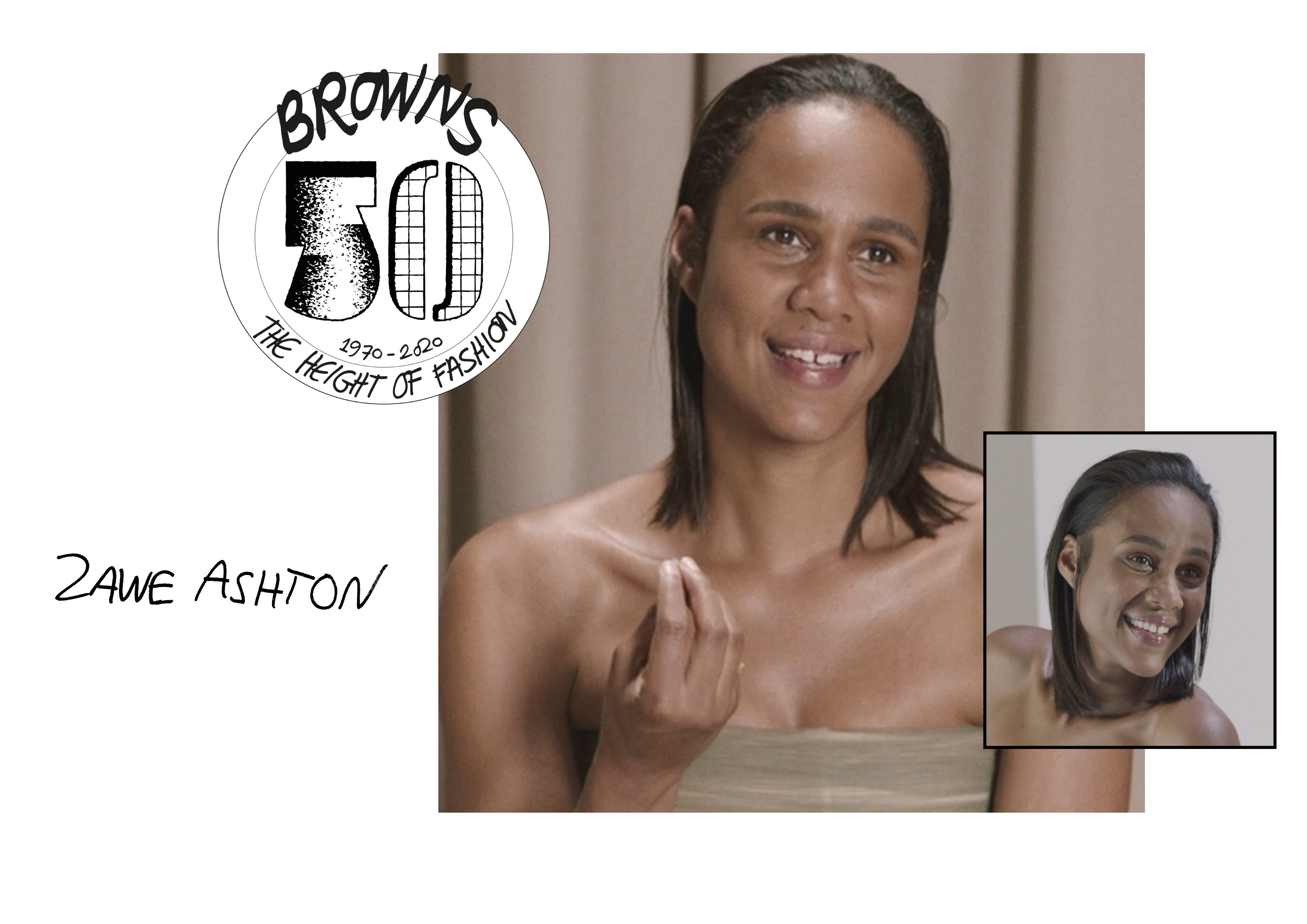Browns 50: A Conversation With Zawe Ashton

Zawe Ashton has worn a myriad of hats in show business — as a film and theatre actor, director, writer and late night TV host. Her career, which she began at just six years old, is multilayered and transcends traditional categorization. The London-born polymath boasts leading performances on Fresh Meat, Netflix’s Velvet Buzzsaw, the Broadway play Betrayal. Her own play, For All the Women Who Thought They Were Mad, released in 2019, addresses the rampant cultural bias faced by Black women in the healthcare industry. The powerful drama feels more important than ever in the midst of the global Black Lives Matter Movement. Armed with a passionate drive and love for her art, along with a refusal to adhere to the structural limitations of race and gender, Zawe is only getting started. Fresh from the Browns 50 shoot, she tells us more.
What are your first memories of wanting to act?
I started when I was six. I knew when I started acting classes that I wanted to do it for the rest of my life. The Anna Scher theatre classes were based on respect and integration. Learning about poetry, history and the world was just as important as crafting ourselves as actors. I’ve never let go of the activism instilled in me there.
You’re also a playwright and screenwriter, and the author of Character Breakdown. Can you tell me more about the writing aspect of your career?
I started writing and reading poetry in my teens. I fell in with a group of artistic people in college. Instead of clubbing, we’d write rap and poetry. I won the title of Youngest UK Slam Champion when I was 17. Later, I began integrating writing into acting. I realized there weren't enough scripts for people who looked like me at my school. That’s when I wrote my first play, and from there, everything came.
Your play, For All the Women Who Thought They Were Mad, released in 2019, is about the Black female experience confronting racial prejudice in health and pharmaceutical institutions. Can you speak on that — given the play’s ongoing relevance in light of the BLM movement?
I wrote it aged 25, and for 11 years no one wanted to put it on. It’s about Black maternal mortality, cultural bias, and Black female relationships that exist without a dominant caucasian character. People were scared to put it on because they were unfamiliar with the wider context. Now the mortality rate for Black women in the US is a hot topic, but people dying isn’t a hot topic. How many Black playwrights and screenwriters are waiting for the times to catch up with their experiences?
Your first novel, Character Breakdown, is a fictitious memoir about a Black female actor. What are some challenges you’ve faced as a BIPOC in entertainment and how can future generations overcome those challenges?
There’s a spectrum of different types of aggressions and prejudices. When I started acting, I’d be asked to come to set already done-up, because they didn't have people willing to do my hair and makeup. It was the same for many BIPOC actors. The trailer is this peaceful rite before going on screen, and POC get robbed of that. It has lasting psychological effects. In 2020 there are still models and actors calling people out.
I’ve also been yelled at in meetings about my artistic property. The question is, would this be happening to a white male counterpart? I don't think so. Both my play and book are about cultural bias, micro AND macro aggressions and the white male gaze. When we keep writing and talking about it, we make the next generations aware of their strength.
How does costume affect you as an actor? And what are some of your favorite TV and film fashion moments?
Costume has a huge effect on me as an actor. If I'm wearing the wrong shoes, I find it hard to fully embody the character. One of my breakthrough moments was the creation of the character Vod for Fresh Meat alongside June Nevan and Janet Horsefield. Vodd’s style embodied every era of fashion — ‘90s rave, ‘80s punk, afrofuturism, with some ‘70s psychedelia and Grace Jones-esque androgyny. The most stylish films are from the ‘50s and ‘60s Italian neo-realists, and the French Nouvelle Vague. Even an alien from outer space would see how they dressed and think they were iconic.
How does your style change according to where you are? Do you dress differently when in London than in NYC?
I'm incredibly affected by my environment when it comes to fashion. The American and UK styles are so different. We’re more experimental and confrontational here. In the US, things can feel a bit more… sexy and normcore.
Who are some designers you love?
I still wear designers who supported me from the beginning — The Vampire’s Wife, Stella McCartney, Erdem, Tom Ford, Christopher Kane, my friend Roksanda... It's nice to support people who also support me. Fashion can be kind, it doesn't have to be harsh.
What are some upcoming projects you’re working on?
I’ll be shooting The Handmaid's Tale in Toronto. I’m a Margaret Atwood fanatic and Elisabeth Moss is incredible. Talk about iconic fashion on that show… I’m also finishing a couple of screen projects and there could be a new book beginning to bubble up...
Zawe wears dress by Khaite from our exclusive Browns 50 Designer Collaborations.
Interview by Katrice Dustin. Katrice is a writer and editor based in Berlin, DE. Her work has been featured in i-D, The Travel Almanac, King Kong and HERO.
Related Reading:
Browns 50: The Height Of Fashion
Browns 50: The Fashion
Browns 50: The Family Album